What Does Coconut Water Taste Like? Tropical Sip or Acquired Flavor?
Coconut water has become a trendy beverage that sparks curiosity among health-conscious individuals and casual drinkers alike.
Tropical regions have long celebrated this natural drink, but its global popularity has surged in recent years.
Countless people wonder about its unique flavor profile and sensory experience.
Some find themselves hesitant to try something unfamiliar, unsure of what to expect from this refreshing liquid.
Nutritionists and beverage enthusiasts rave about its potential benefits, which only adds to the intrigue surrounding this drink.
The taste remains a mystery for those who haven't yet experienced its distinctive characteristics.
Uncover the surprising details about coconut water's flavor and why it has captured the attention of so many refreshment seekers.
Coconut Water: Basics
Coconut water sits inside the shell of a young palm tree fruit, looking clear and fresh.
Makers pull this liquid from coconuts that are around 5-7 months old.
Water from these fruits carries lots of good stuff like vitamins, minerals, sugar, enzymes, amino acids, cytokines, and phytohormones.
Hawaiians call this drink a gift from the sky.
Sipping water right from a coconut feels totally safe.
Water from coconuts works as a natural way to balance body minerals and keeps you hydrated.
Someone feeling sick might find this drink helpful for feeling better.
Some bodies react differently, though, and could experience stomach issues after drinking too much.
Flavor Of Coconut Water
Coconut water catches attention as a worldwide favorite drink.
Semitropical and cold regions actively import this popular beverage.
Multiple people enjoy this pleasant drink during any moment.
Small differences set this drink apart from competitors.
Its flavor carries a slightly nutty background with savory notes.
Unique clean taste stands out, making it worth sampling.
Certain brands guarantee 100 percent raw quality, preserving natural compounds and healthy enzymes.
Coconut water surprises many drinkers with its unusual flavor profile.
Water from coconuts does not taste exactly like coconut itself.
Hints of nuttiness emerge without strong sweetness.
Compared to coconut juice, this drink feels milder and more subtle.
Refreshing qualities shine through its neutral taste.
Some consider it among the most neutral beverages available.
Drinking coconut water straight provides a simple pleasure.
Light and crisp characteristics make it an excellent standalone beverage.
Worldwide recognition as a natural water option highlights its appeal.
Experts sampled eight different pulp-free coconut water brands to understand taste variations.
Differences in Flavor by Coconut Age (Young vs. Mature)
Coconuts change a lot as they age, and the difference between young and mature coconuts is easy to taste and see in the kitchen:
Knowing the age of a coconut helps you choose the right one for your recipe, whether you want something sweet and refreshing or rich and hearty.
Top Uses For Coconut Water
You can enjoy coconut water anytime you like.
It’s a healthy, refreshing drink on its own, but if you’re not a fan of the taste, here are some fun ways to use it:
Coconut Water in Global Cuisine and Cocktails
Coconut water is a light, naturally sweet drink enjoyed around the world, and it adds a special touch to both traditional dishes and modern cocktails:
Whether in a street market, a beach bar, or your own kitchen, coconut water brings a refreshing, global flavor that brightens both food and drinks.
Coconut Water in Sports and Fitness Drinks
Coconut water is a natural and refreshing choice for sports and fitness drinks, offering both hydration and gentle sweetness without extra additives:
Choosing coconut water for your workout drink keeps things light, natural, and perfectly hydrating.
Is Coconut Water Hard To Drink?
Coconut water carries a slightly odd sweet taste.
Such weird flavor becomes part of its charm: sugars and salt making it seem unpleasant actually help keep you hydrated.
Coconut water does contain calories, so health benefits show up more for active individuals.
Heat pasteurization explains this characteristic process.
Manufacturers cook products at extremely high temperatures to kill microorganisms and extend shelf life.
Scientific research indicates heat also breaks down enzymes and destroys certain vitamins, minerals, and phytonutrients.
Coconut water offers a unique flavor profile.
It feels light and fresh when consumed alone.
Chefs use this liquid as a healthy ingredient in multiple dishes.
Natural water from coconuts contains multiple nutrients like vitamins, minerals, amino acids, enzymes, phytohormones, and cytokinin.
Subtle nutty notes define its taste.
Water itself seems almost tasteless.
Drinking directly from fresh coconut shells remains possible.
Wondering about daily coconut water consumption makes sense.
Medical experts generally consider this beverage safe for regular drinking and recommend it as a natural source of electrolytes.
Does Coconut Water Taste Sweet Or Sour?
Coconut water offers a slightly sweet-sour nutty taste when freshly extracted.
However, it quickly turns sour after opening, so you should keep it cold and drink within one day.
Most packaged versions go through pasteurization, with preservatives added shortly after exposure to air.
Packed with sugar and electrolytes, this drink contains easily digestible carbs.
Coconut water comes from young, green coconuts as a clear liquid.
Unlike fatty coconut milk or oil, it carries natural sweetness.
Sugar levels can shift based on producer additions.
Coco water originates from coconut farms in Philippines, Thailand, and Vietnam.
Nutty and refreshing, it works great during warm weather.
Chilled consumption brings out its best qualities.
Drinking options remain flexible throughout the day, though refrigeration helps maintain taste.
Sweet without overwhelming flavor, this drink might suit many preferences.
Coconuts hold special status because of their delightful water.
Sri Lankan varieties stand out as particularly sweet compared to standard options.
Drinking Coconut Water: Health Effects
Helps keep your body well-hydrated.
Coconut water contains few calories and carbs, similar to sports drinks with extra sugar and flavors.
Should You Chill Coconut Water?
Sealed coconut water packages can sit on shelves for about a year without spoiling.
This works because the liquid lacks preservatives or additives, which means refrigeration becomes crucial after opening.
Coconut water left outside the fridge for more than a day or stored in the refrigerator beyond one week should go in the trash.
While the drink might seem fine, health risks make tossing it the smart choice.
Beverage specialists recommend keeping coconut water refrigerated for no more than 3 or 4 hours.
Storing coconut water requires placing it in a freezer-safe container filled halfway, then placing the uncovered container in the freezer.
Can You Drink Coconut Water Daily?
Coconut water stands out as a healthy drink you can sip throughout the day.
This natural beverage works well instead of sugary fruit juices and helps refresh you after intense exercise.
Zero calories make coconut water an excellent choice for daily drinking or recovering from workouts.
Chilled coconut water tastes great, and mixing in some lemon can add extra flavor.
Packed with electrolytes, coconut water supports heart health, helps control blood sugar levels, boosts kidney function, and keeps you hydrated during and after physical activity.

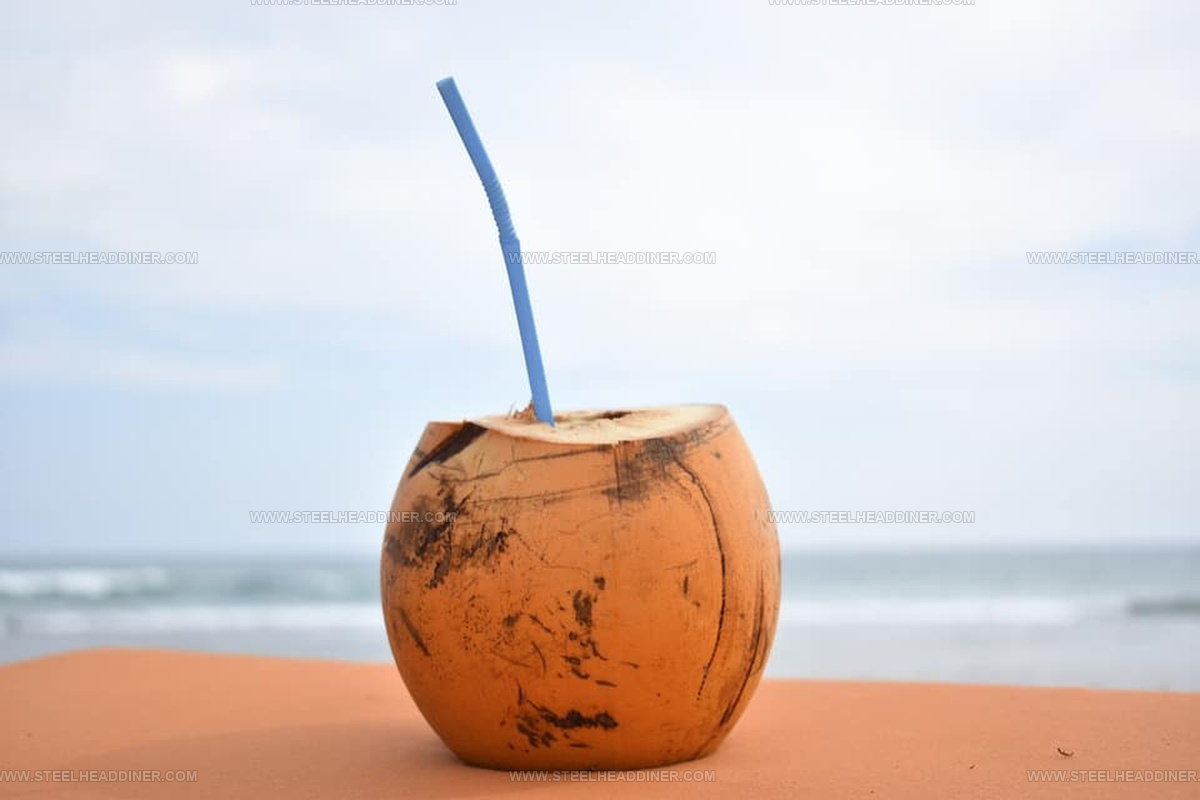
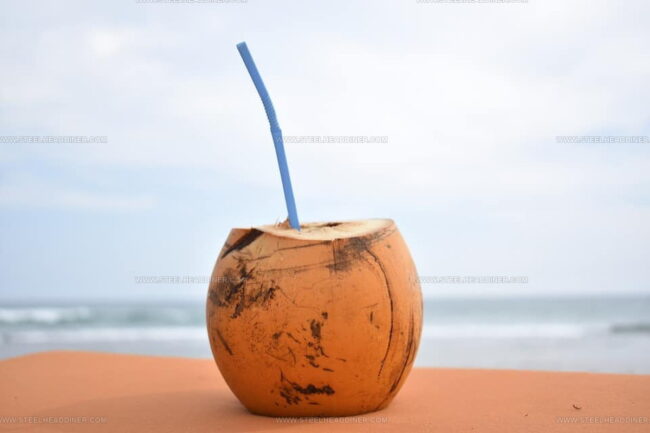
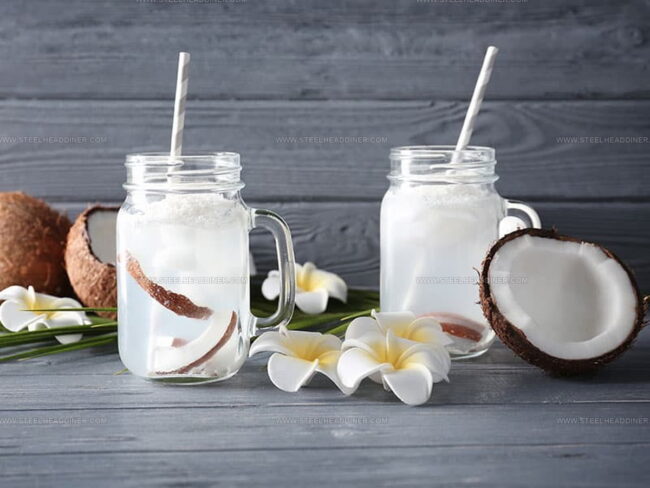
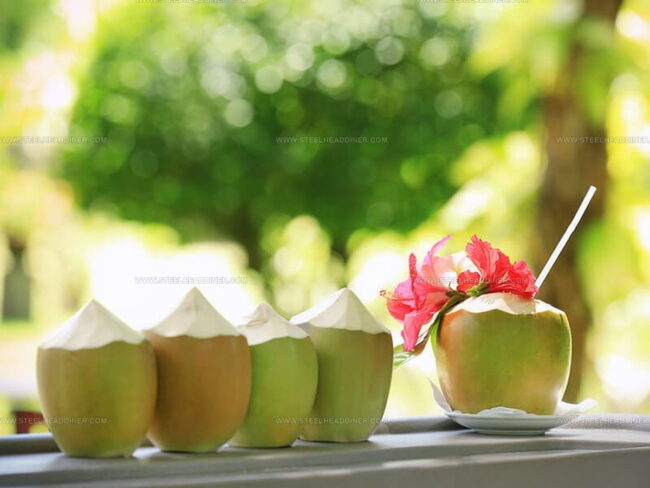
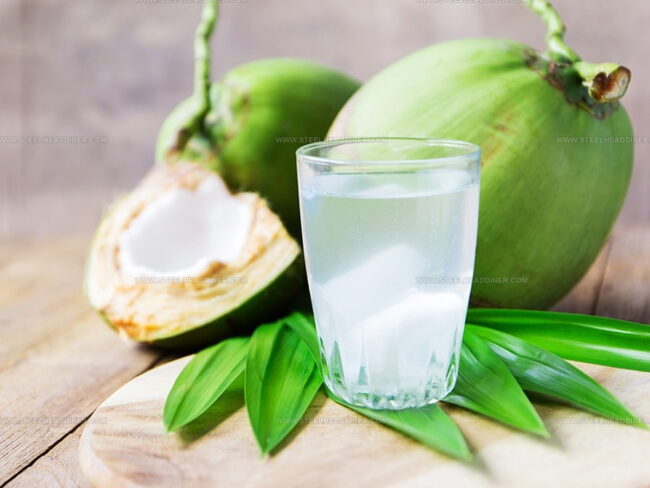
Maya Thompson
Culinary Content Creator & Nutrition Enthusiast
Expertise
Healthy single-serving recipes, Meal prepping for individuals, Integrating nutrition into everyday cooking, Vegetarian and plant-based cuisine
Education
The Chef’s Academy at Harrison College
Associate of Applied Science in Culinary Arts
Focus: Nutrition, meal planning, and culinary techniques for healthy living.
Maya found her passion in the kitchen by mixing good food with good energy. After earning her culinary degree at The Chef’s Academy at Harrison College, she made it her mission to keep cooking simple, wholesome, and packed with flavor.
At Steelhead Diner, Maya shares easy, healthy recipes built for real life. For Maya, great food seems like a celebration of everyday moments, made better one fresh bite at a time.